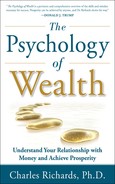Book Club Questions
1. A psychology of wealth can be learned in childhood through the values we are taught. Senator Leticia Van de Putte recounted important lessons that she learned from her parents. Discuss how her parents helped to prepare her for a future she didn’t expect.
2. If you were to define the word wealth right now, what words would you use? How might these words help you to better understand your personal psychology of wealth?
3. Tony Cupisz and his twin brother, Mike, had a difficult childhood. Ultimately they realized they could create a life that was different from the life of their adoptive parents. What were some actions Tony took to start moving toward his goals? How might you apply some of his strategies to move toward greater success and happiness?
4. Self-esteem is a fundamental human need. When we have a solid sense of self-esteem, we feel confident in our ability to cope with life’s challenges. Why is self-esteem an essential component of a psychology of wealth?
5. Our lives reflect the conscious and unconscious choices that we make each day. Darren Hardy of SUCCESS magazine observed, “In essence, you make your choices, and then your choices make you. Every decision, no matter how slight, alters the trajectory of your life.” What slight changes might you make each day to affect your life positively, both now and in the future?
6. Viktor Frankl, a Nazi concentration camp survivor, became known for teaching that life’s meaning comes not from what happens to us, but from how we respond to it. Discuss the difference between reacting and responding consciously to what life presents to us.
7. Traditional consumer installment lending is still done face to face, the old-fashioned way. All borrowing once required face-to-face discussions between the borrower and the lender about the borrower’s needs and means. How did so much of our borrowing morph from a transaction that requires consultation and deliberation into the ability to borrow and spend instantaneously? Discuss how this change has enhanced or detracted from your psychology of wealth.
8. What would our world look like today if credit had never been extended to average citizens?
9. During the recession, many people have become afraid to spend and borrow. Why is this fear counterproductive, both to us as individuals and to our society?
10. One of the joys of experiencing prosperity is the ability to give back—to take care of ourselves so well that we can afford to share with others abundantly. How does giving open us to receiving even more?
11. Dennis Gardin turned the worst experience of his life into the greatest blessing. What did he learn by overcoming his fear, and what can we learn from him about the psychology of wealth?
